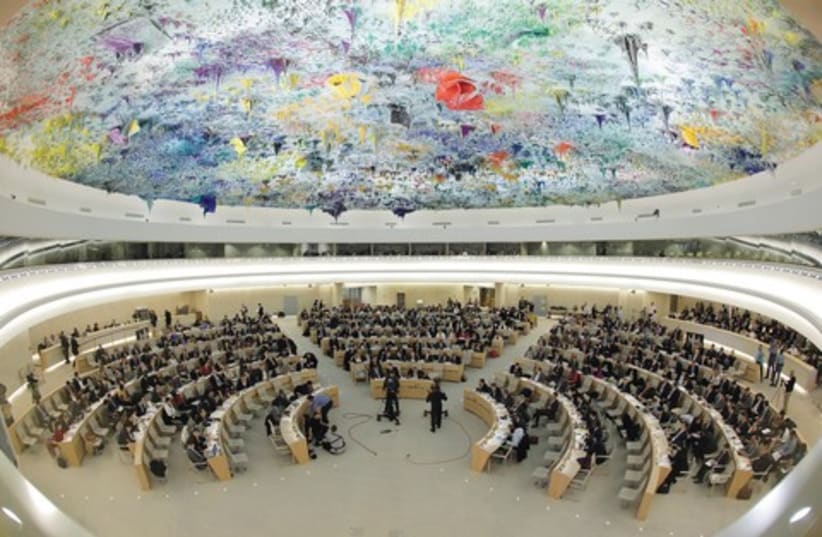The UN Human Rights Council replaced the UN Human Rights Commission in 2006. Unfortunately, the change in name was not followed by a change in attitude.
The obsessive concentration on Israel at the expense of many other countries where human rights actually are flagrantly violated is not the exclusive purview of the UN Human Rights Council, to be sure. The UN in general tends to devote more time to Israel than to any other country. The Human rights Council (and its predecessor, the Human Rights Commission) have devoted more time to Israel than to Syria, Iran and North Korea combined.
A cursory look at the list of countries that voted in favor of the appointment of such a special commission would ignite a loud laughter in any decent individual. World-known champions of human rights like China, Cuba, Russia, Bolivia, Pakistan, Bangladesh, Libya, and Venezuela can be found among them. As a matter of fact, the overwhelming majority of the countries that voted in favor of the resolution are either authoritarian countries or states with a deficient parliamentary democratic system.
The absurdity of a Human Rights Council voting in favor of a resolution against a parliamentary democracy defending itself against a totalitarian terrorist organization calling for its destruction is mind-boggling. The fact that such a parliamentary democracy is a member state of the United Nations Organization only compounds the absurdity.
Israel is the only country on earth whose legitimate sovereign existence is called into question, among others by Hamas, which openly and explicitly calls for its total elimination. Rather than condemn without ifs and buts such a blatant call for the destruction of a member state of the United Nations Organization, the Human Rights Council decides to investigate what Israel did to defend itself against massive rocket attacks from Gazan civilian centers aimed intentionally at its civilian population. Further, according to the resolution concerned, Israel should be investigated more widely, including for its actions within Israel itself.
The Orwellian twist in this story is quite remarkable: A combination of authoritarian states and deficient democracies have resolved to investigate the only parliamentary democracy in the Middle East, a country endowed with an independent judiciary and a free press.
The wording of the resolution is so blatantly biased against Israel that one wonders why a special commission should be appointed when the culprit is already declared to be Israel. Even for the Human Rights Council such a biased resolution seems to be extraordinary.
The fact that it was put forward by Pakistan and the Palestinian Delegation to the United Nations only shows the intention behind it: not to investigate, but to castigate.
Israel’s legendary foreign minister, the late Abba Eban, once said that if a resolution were presented by countries hostile to Israel before the UN stipulating that the Earth was flat, only a minority of countries would oppose it.
International Law is too important to be left in the hands of institutions that make a mockery out of it. If international law is to be taken seriously, it must be formulated, interpreted and implemented seriously.
The Human Rights Council is neither human nor right. It has made a travesty of international law. Rather than concentrate on human rights violators, it has decided to draw its obsessive attention to Israel. This time, it has surpassed itself. Enough is enough. The time has come for the Human Rights Council to cease to exist – for the benefit of human rights and international law.
The writer is a lecturer at the School of Political Science, Government and International Affairs at Tel Aviv University. Email: oxbridge@netvision.net.il
